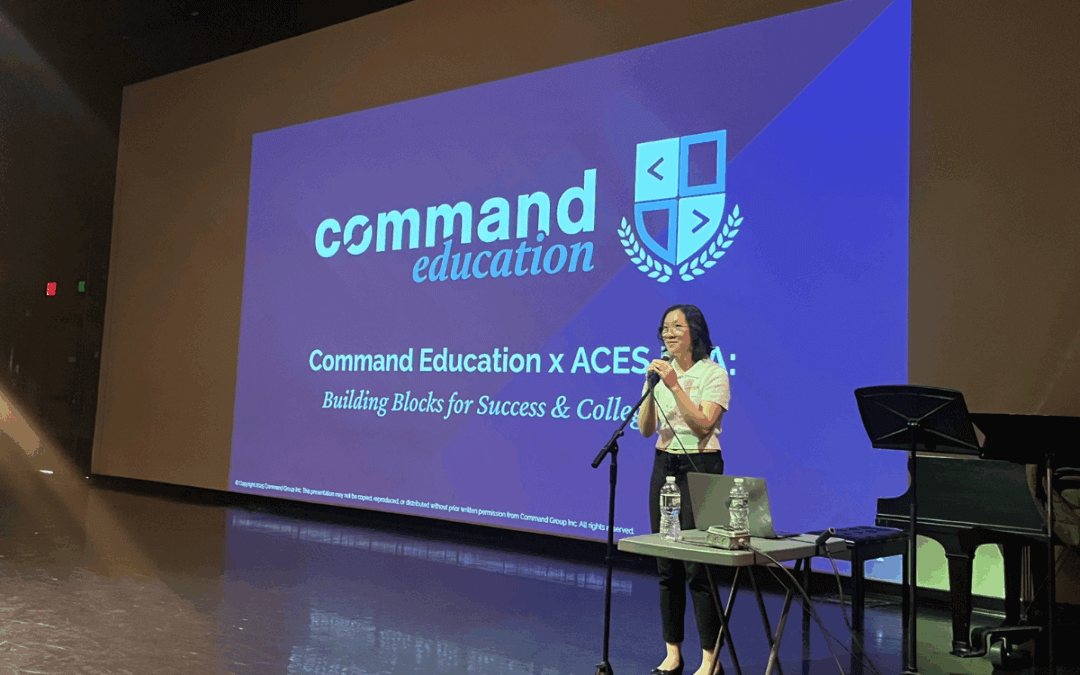Pre-med is one of the most rigorous pre-professional paths that students can pursue. According to one study, only 16.5% of students who intended to complete their degree with the coursework necessary to attend medical school do so, as more challenging courses weed out thousands of students from competitive programs. Given the significant challenge of both keeping up with the demands of coursework and developing a competitive extracurricular resume, it is imperative that students start preparing for their future studies in medicine early on.
But what will truly make an applicant stand out from the crowd? Are admissions officers most impressed by challenging coursework? Healthcare-oriented extracurriculars? Prestigious summer programs? And how can students begin developing an impressive profile early in their high school career?
Every admissions cycle, Command Education Senior Mentors work with students to develop admissions profiles that don’t just show off their academic preparedness, but also their niche interests, dynamic personalities, and commitment to serving their communities. Below, Senior Mentor Ellen shares insider expertise into how our Senior Mentors help students develop strong pre-med hooks!

What are admissions officers looking for in a pre-med applicant?
Ellen: First and foremost, it is important to note that pre-med is not a formal program or major to which students apply; instead, it describes a set of courses that prepare students to take the MCAT and subsequently apply to medical school. Essentially, students can major in any subject as long as they also complete the required pre-med coursework. Courses including general chemistry, biology, organic chemistry, biochemistry, and physics set students up well for the kind of thinking required of medical students. Pre-med academic advising is also available at most colleges to help students ensure that they are completing required coursework. That being said, when evaluating applicants who have an interest in medicine, admissions officers are looking for applicants with a specific passion for the medical field and evidence to demonstrate that passion.
Every admissions cycle, admissions officers read numerous applications that say some variation of: “I want to become a doctor to help people.” But beyond this vague sentiment, admissions officers want to know: what specifically inspired your interest in medicine? What type of learning do you enjoy in STEM? What would you like to do with your degree to make a meaningful impact on the medical field? Top schools also look for evidence of how students have exposed themselves to the medical field in real world contexts. As such, it is critical that applicants’ materials showcase tangible experience in healthcare related contexts. Have you done research? Volunteered at a hospital? Shadowed physicians?
Pre-med related majors, such as biology or neuroscience, also require a lot of grit, motivation, and time management skills. If you are applying as a pre-med student, your extracurriculars, coursework, letters of recommendation, and supplements should clearly showcase your ability to effectively manage the demands of rigorous academics alongside other hands-on activities in your community.

What classes should a student interested in pre-med take?
Ellen: Pre-med students in high school should be excellent students overall, but should focus particularly on hook-aligned classes. Applicants should be able to show that they took the most challenging classes available to them in biology, physics, chemistry, and psychology (whether APs, IBs, or Honors classes). I would also recommend Spanish (or a second language relevant for communicating with patients in their geographic area) or Latin (for understanding medical terminology) and any classes that can show that they are a strong reader, writer, and critical thinker, as part of the MCAT includes a critical analysis and reasoning section. Finally, having a strong foundation in math is essential: I recommend that students take AP Statistics and AP Calculus to establish mastery in math skills.

Should I apply for a BS/MD program? What is the difference between these programs and a typical pre-med track?
Ellen: BS/MD programs offer ambitious students an accelerated path into the medical profession. Most programs follow a typical structure of a 4-year undergraduate curriculum followed by 4 years of medical school within the same university, but some propel students from their undergraduate study into residency in only six years. The advantage of a BS/MD program is that students are essentially pre-admitted to medical school under the condition that they maintain a minimum GPA determined by the program (often around a 3.5). Many programs also waive the MCAT requirement, which can be a significant advantage; however, some require that students take the test before advancing beyond the undergraduate curriculum and achieve a minimum score (typically around 500).
In light of these factors, BS/MD programs are a good fit for students who have known since middle school that they want to be a physician, have started engaging in extracurriculars related to medicine, and are very sure of their path. Completing clinical rotations or hours may be required or highly recommended for these types of programs, and students who have logged hours volunteering at clinics, nursing homes, or as an EMT on an ambulance are likely to stand out in the admissions process. BS/MD programs are incredibly competitive, so applicants must compellingly demonstrate both exceptional time management and academic excellence to be regarded as a strong candidate.

How important is research experience in high school for students interested in the pre-med track?
Ellen: Research experience can be a significant asset on your application, but is not required. Summer programs offering laboratory exposure can be a great way to gain exposure to research, but students can also pursue research independently outside of a formal program. Whether participating in a formal program or conducting independent research, students should keep in mind that any research can demonstrate interest in research methodology and critical thinking—it doesn’t have to be related to the medical field. When it comes time to assemble their application materials, students should be intentional about highlighting this experience and connecting it to their goals of pursuing a career in medicine.

What extracurricular activities should students interested in pre-med pursue?
Ellen: Ultimately, students should pursue any extracurricular (sports, music) that they are passionate about and that demonstrates who they are as an individual. Selecting activities based on what you assume an admissions officer wants to see will likely convey inauthenticity and often fails to distinguish students from thousands of other pre-med applicants. That being said, clinical experience, research, tutoring, and volunteering in your community can show meaningful engagement and alignment with the values of the medical profession. Students can identify these types of opportunities while also finding ways to make their participation unique and reflective of their individual skills and interests.

What summer programs are best for high school students who want to pursue medicine in the future?
Ellen: One of the most impressive and rigorous summer activities students can pursue is admission into a prestigious, merit-based summer program that provides exposure to research. Programs such as Research Science Institute (RSI) at MIT, Summer Science Research Program (SSRP), or Stanford Institutes of Medicine Summer Research Program not only provide invaluable experience but also show colleges that your work has been rigorously evaluated by experts in the field. Many colleges also offer summer research programs where high school students can work alongside staff on projects, which can offer wonderful professionalization opportunities for students. Shadowing physicians, volunteering at clinics, or becoming a certified EMT are also valuable ways to spend summers.

How do Command Education Senior Mentors help pre-med applicants stand out?
Ellen: Command Education Senior Mentors help students with every aspect of building their pre-med profile. This starts by working closely with students to identify classes, extracurricular activities, and summer experiences that both make them a strong candidate in pre-med and also demonstrate their unique perspective to admissions committees. Senior Mentors also help students identify colleges, programs, and majors that are the best fit for them—from evaluating whether BS/MD programs are right for them, selecting EA/ED schools, and creating a balanced list of match, reach, and safety schools. We are there to guide students every step of the way, providing a strategic, long-term vision for students to achieve their goals.
If your child is interested in pursuing a pre-med track, schedule a free consult today to learn how our Senior Mentors can help them stand out to their dream school and chart their path to the medical profession!











